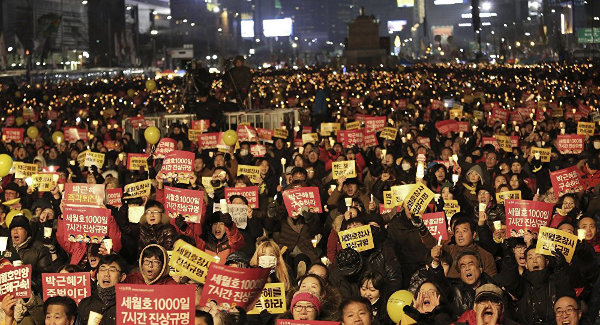South Korea
11 Weeks of Protests, 10 Million People: Demand the President STEP DOWN
January 7, 2017 | Revolution Newspaper | revcom.us

Protesters call for impeached President Park Geun-hye to step down during a candle light vigil in Seoul, South Korea, January 7. (AP photo)
On January 7, over half a million protesters took to the streets of Seoul, South Korea, to demand the impeachment and immediate removal of President Park Geun-hye. Other protests took place in cities all over the country. These protests marked the 11th week in a row that people have taken to the streets in Seoul to demand an end to Park’s presidency.
South Korea is a country of 50 million people. For almost three months now, there have been protests every week, some with as many as two million people. Cumulatively, over 10 million people have taken to the streets to demand Park step down.
Park Geun-hye, elected South Korea’s first woman president in 2012, was already very unpopular. But in October public sentiment against her went to a whole new level. A scandal broke out involving her friend, informal adviser, and spiritual guru, Choi Soon-sil. Park is accused of giving Choi access to secret government documents and Choi is said to have used her relationship with Park to force companies to donate millions of dollars to foundations she runs. At the start of November Choi was arrested and charged with abuse of power, extortion, and attempted fraud—charges that could give her up to 15 years in prison.
But the arrest of Choi did not quell the protests, which got even bigger and more determined. As long as Park is in office, she has immunity from criminal charges, but protesters say she must step down AND be jailed.
Reportedly lawmakers were hesitant to take measures to oust Park but in the face of all this, the ruling class looked for a way out of the crisis. On December 9 the National Assembly voted overwhelmingly (234-56)—including Park supporters and her opposition—for impeachment and a court was given six months to rule on the vote.
The next day, half a million people demonstrated—celebrating the vote but also demanding that the court rule immediately to impeach and that Park face criminal charges. Protests continued every week: On Christmas Eve. 500,000 marched toward the presidential Blue House, where Park lives, chanting, “Arrest Park Immediately.” Some were dressed up like Santa and sang Christmas songs with lyrics changed to mock Park. Huge demonstrations were also held on New Year’s Eve.
Before this crisis, there was already a lot of hatred and mistrust among the people for Park and the legacy of her whole family. Her father, Park Chung-hee, seized power in a military coup in 1961 and ruled as a brutal president and military general until he was assassinated in 1979. In 1972, he declared martial law, ushering in a period of open dictatorial rule with intense police surveillance and a National Security Act that gave the government freedom to imprison anyone it considered “anti-government.” The Korean Central Intelligence Agency (KCIA), formed under the guidance of the U.S. CIA, was Park’s apparatus for domestic security. Park Chung-hee oversaw the massive growth of chaebols (global multinational companies) and the further integration of South Korea into global imperialism—while social and economic inequalities, the denial of workers’ rights, and human rights abuses all rapidly grew.
Now people look at this scandal, involving corruption with companies like Samsung and Hyundai. They look at how Park has suppressed journalists. They see how she has instituted repressive measures like declaring demonstrations illegal. They look at the allegations that Park blacklisted some artists for their political beliefs. And many see Park as continuing in her father’s footsteps. And the protests have come to encompass broader concerns about the country’s political system, the power of the presidency, the power of big corporations, and government suppression of the press.
Another big demand that has emerged from the protests has to do with Park’s failure to protect people in the tragic ferry disaster in 2014 in which 300 people died, mainly high school students. For many people, this concentrated the illegitimacy of her rule. Kim Joonhyung, a professor at Handong Global University, says that people’s feelings about the illegitimacy of Park’s presidency and the government itself can be traced back to this ferry disaster: “There was a feeling that if the state doesn’t care about people’s lives, we don’t want to pass this government on to our children.... At the same time, the Korean people feel more empowered they can change their situation. It is a big turning point.”
Park is fighting back. Oral arguments in her impeachment trial began on January 5, but she did not show up and her lawyers say she will not testify. Her lawyers tried to say the protests of millions of people are illegitimate, saying Park is the victim of “mob rule.” They said the protests “are not the will of the people, yet the National Assembly inserted them into its grounds for impeachment.” Park maintains she is innocent, her lawyers say she only made “trivial” mistakes.
In the eyes of millions, Park has lost her legitimacy to rule. And the whole ruling class in South Korea faces great necessity, to try to deal with this whole situation to prevent a legitimacy crisis that goes beyond Park. Millions of people in South Korea are acting on something that others in history have proven to be true: That just because a president is elected, it doesn’t mean the people can’t force them out of power.
Volunteers Needed... for revcom.us and Revolution
If you like this article, subscribe, donate to and sustain Revolution newspaper.
